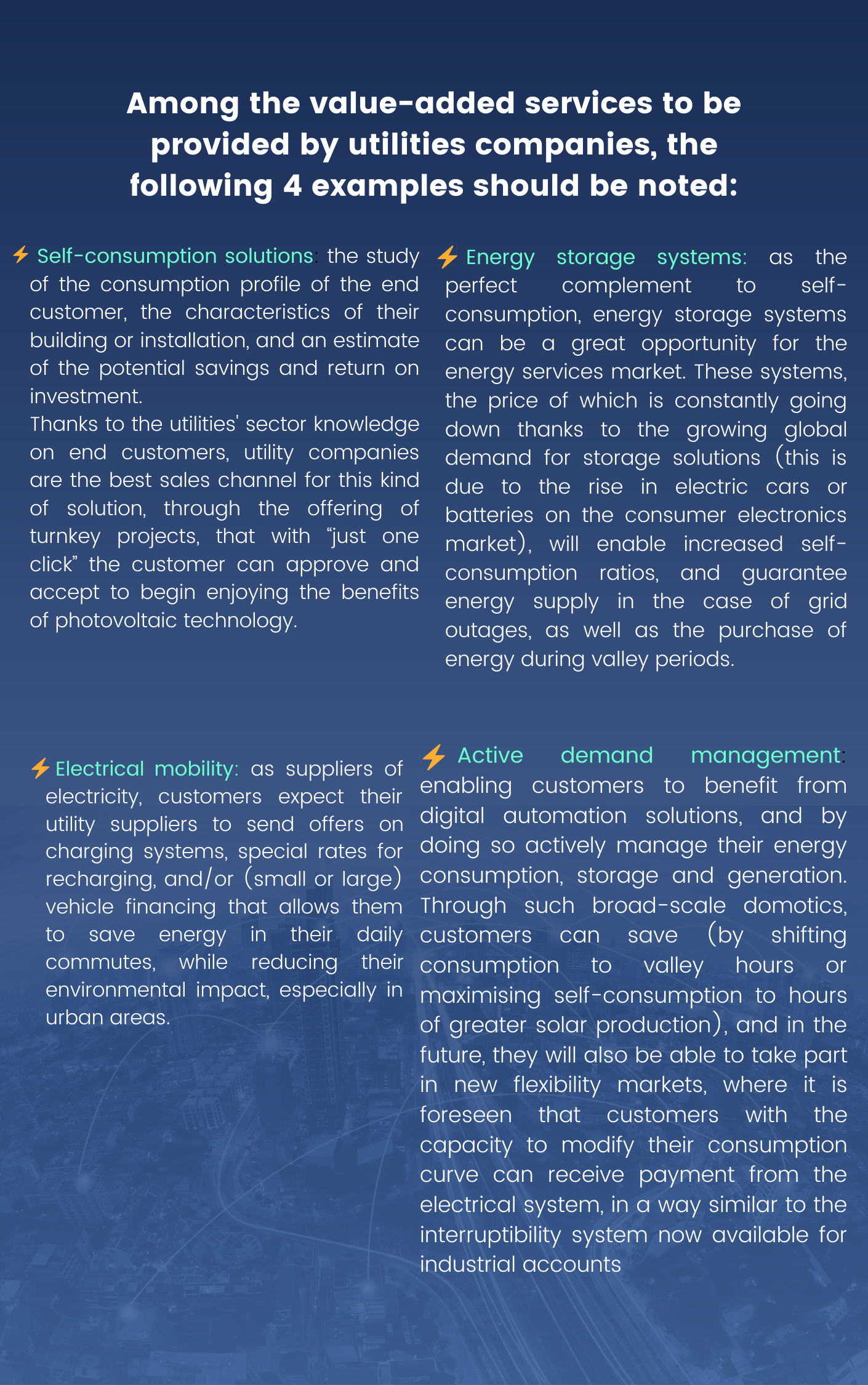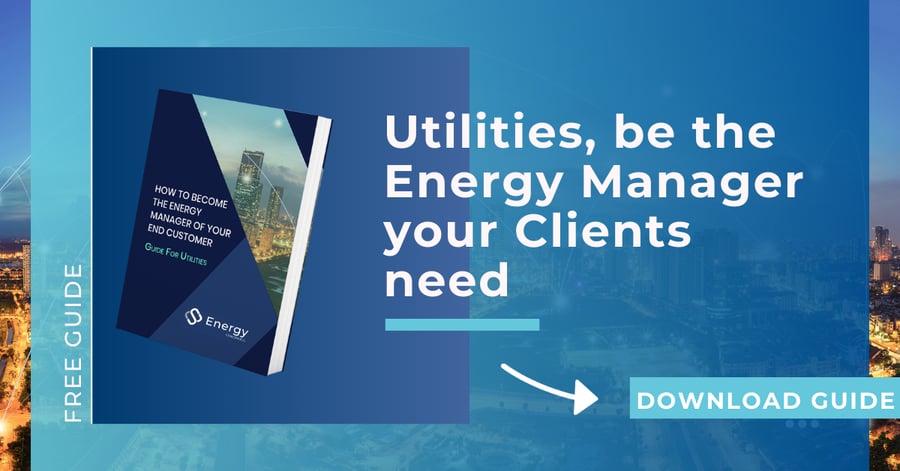If you are an Energy Manager or a Utility, how would you help customers manage their energy to be more efficient? This is exactly what the following article is about, how energy marketers can help their customers save energy and be more efficient by becoming their energy manager:
First, let’s talk about something that’s been on your mind…
Can energy efficiency technologies be a threat?
End customers, in keeping with the growing social interest in sensitive topics such as the climate emergency, sustainability or secure energy supply, are more prone to take an interest in new energy solutions that help them join the transition process underway at the worldwide level. Within this process, certain technologies stand out such as high-efficiency heating and cooling systems, generation of photovoltaic solar energy, electrical vehicles or efficient lighting technologies, among others.
For energy companies, this context could be perceived as a threat:
The higher customers’ energy efficiency, the less energy they will consume.
Nonetheless, there are different factors that can convert this threat into an opportunity unprecedented in the sector.
Electrification: One area of this energy transition involves transferring part of the consumption, typically based on fossil fuels, to electrical consumption.
A clear example is electric vehicles (such as cars, but also including those of a smaller scale such as scooters or bicycles). In the same vein, this category would include heat pump HVAC systems.
It will lead to an increase in the electrification of energy, which despite gaining inefficiency, could also trigger a rise in consumption of (preferably renewable) electricity, to the detriment of other energy sources with bigger environmental impacts.
From selling energy to selling services: Reduction in energy sales, which as previously discussed, will be accompanied by a reduction in commercial margins, will also lead to a rise in the consumption of services by the end customer.
These services, which can range from the sale, installation and maintenance of a photovoltaic system, to the acquisition of electrical mobility equipment, can be an opportunity for utility companies, which enjoy direct contact with consumers, and trust that has been built over decades, time in which these companies have been the energy supplier of reference for their customers.
Financing: Energy companies can offer their customers better financing terms than they can get from most banking entities, which adds another potential line of revenue.
Electric companies must seize the moment and use their advantageous position and means to offer value-added services to their customers.
If utilities fail to seize this opportunity, customers will go to other parts of the value chain to find these services, leaving power utilities to face a progressive decline of their sales and profit volumes.
In order to guarantee success in the sale of services, utilities must come up to the speed of other sectors such as banking or telecommunications, using digital sales channels as the main means of communication and sale of new services to end customers.
Nonetheless, digital tools on their own cannot guarantee success: customers require a higher degree of personalisation that enables them to reinforce the bond of trust with their electricity provider, and therefore be more likely to consume products and services from it. To make this goal possible, DEXMA’s vision is to
Turn electrical utilities into their customers’ energy managers and advisers.
A utilities’ manager/adviser is an agent external to the company whose aim is to help their customers optimise any energy-related issue. To do so, they must be capable of:
- Detecting all of a company’s needs
- Raise awareness on consumption savings
- Adjust the installations, maintaining the company’s operational service level
Later, it will be possible for the utilities’ manager/adviser to draw up the best a solution in each case, with the consequent economic savings and consumption reduction, all linked to greater sales of services. In turn, may give rise to increased customer loyalty and (for example) another outcome could be the financing of services and/or contracting of multiannual services
Likewise, the use of digital channels will also have a positive impact on other aspects of the business, such as: reducing the number of incident management steps related to the collection, rate changes, modification of contracted power, and billing data, among others, bringing down the entire cost of customer management
5 Characteristics of the Customer Energy Manager of a Utility Company
- The manager/adviser must analyse the existence of all expenses that the company wants to reduce; in other words, ascertain what the energy is being expended on. This translates into advising on the amount of energy consumed, and the amount wasted or determining whether the contracted rate could be optimised.
- The manager/advisor knows energy bills in-depth, and is, therefore, able to offer their help and support on each of the items featured on them (transparency).
- Once the company’s consumption has been analysed, the manager/advisor must design a “divide and conquer” strategy. This means that a solution must be designed and then broken down into small, easily achievable steps. For example, starting with the simplest (such as contracting rates better adapted to the needs of the customer), followed by minor actions (such as lighting, with adaptation to LED bulbs) and concluding with advanced management and real-time monitoring of their customers’ energy consumption. Customers penalised by reactive energy make up a clear example. The adviser will have to conduct a study of the origin and quantity of reactive energy and contribute solutions in the form of appropriate devices, such as the capacitor bank best-suited to a customer’s needs.
- One of the most important points for the adviser to take into account are the processes that bring about the highest consumption; such as HVAC or heavy machinery, as these tend to be aspects requiring wide-scale optimisation. Therefore, digital tools that enable the detection and analysis of these consumptions will play a key role in the process of becoming customer energy managers.
- A key point of the advisor is to have good management of the computer tools that currently exist in the market. These software solutions are capable, today, of significantly increasing the day-today efficiency of energy managers. Working with software solutions will provide value-added tools (such as automatic overconsumption detection, comparison with similar buildings, or advanced consumption analysis tools) and a new customer communication channel (through periodic reports, online access to consumption, alert system, etc)
4 Value-added services to be provided by Utility companies
Working with software solutions will provide value-added tools (such as automatic overconsumption detection, comparison with similar buildings, or advanced consumption analysis tools) and a new customer communication channel (through periodic reports, online access to consumption, alert system, etc).
Get to know one of these IT solutions that give added value to the service of the energy manager. Click here to read our free guide on Utilities!






